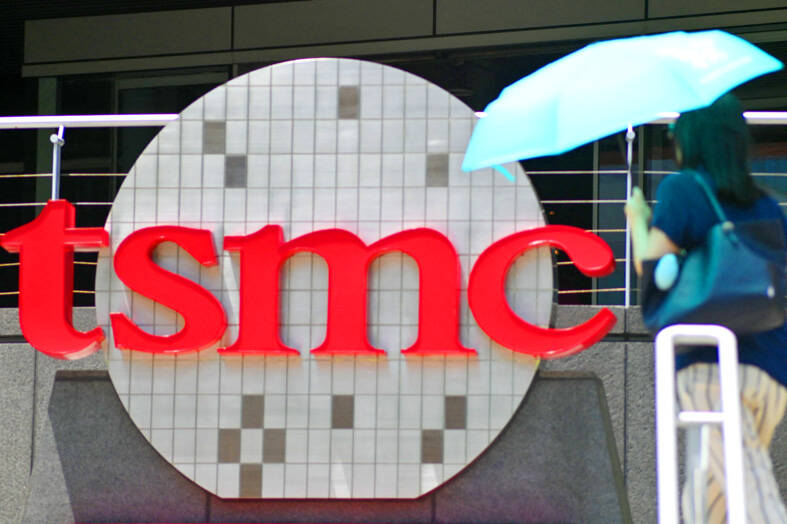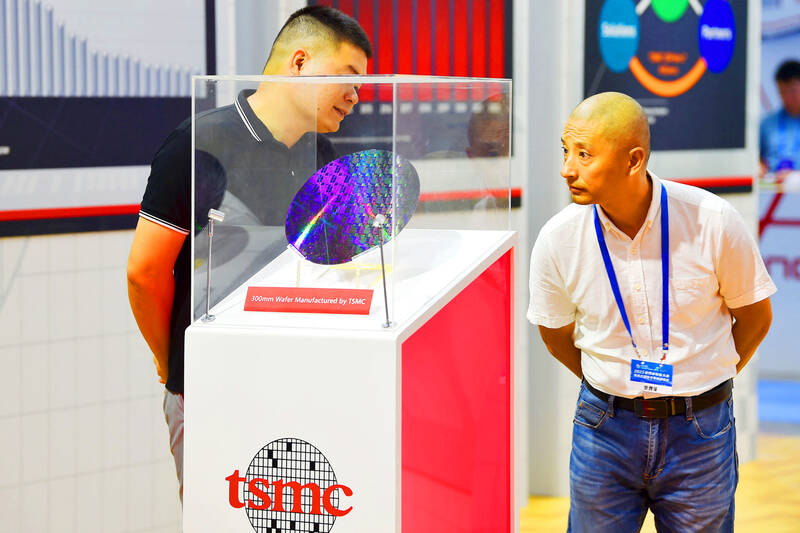Bloomberg
Taiwan Semiconductor Manufacturing Co (TSMC, 台積電) stock fell the most in more than five months after cutting its outlook and postponing production at its Arizona project to 2025, underscoring the challenges of expanding abroad during a protracted electronics market slump.
The main chipmaker for Apple Inc and Nvidia Corp slid as much as 3.8 percent during early trading in Taipei after projecting a 10 percent fall in sales this year, versus previous guidance for a single-digit decline. Shares in chip firms Tokyo Electron Ltd and ASML Holding NV, TSMC’s primary gear suppliers, slid in Europe and Asia. Nvidia declined more than 3 percent in the US.

Photo: Sam Yeh / AFP
The delay in the US — a consequence of a lack of skilled US workers and ballooning costs — underscores the difficulties in making chips there as Washington strives to reduce a global reliance on Asia-based supply.
TSMC’s surprise cut in revenue projections for this year suggests a post-COVID electronics slump might persist, offsetting a surge in demand for high-end chips for AI development. Executives warned investors on Thursday to temper their expectations on that front, saying it was uncertain if that upswell was sustainable. TSMC’s market value had climbed close to 30 percent this year, before yesterday’s slide.
“This is the third cut to its revenue outlook that TSMC has made this cycle,” Needham analysts wrote in a research note. That “may disappoint some bulls, but we see the lack of inventory rebuild through year-end will set up the company for strong growth in 2024.”

Photo: AFP
Executives on Thursday said they were also pushing back the anticipated start of output from its new Arizona plant to 2025. US President Joe Biden’s administration has made development of domestic chip production a top strategic priority, backed by subsidies in the CHIPS and Science Act that could top US$50 billion.
TSMC’s lower sales target for this year suggests a deeper-than-expected downturn in smartphone chips and end-market handset demand, aggravated by worsening macroeconomic conditions, particularly in China. Despite a surge in 3-nanomter process technology node orders for Apple’s new line of iPhones and an uptick in AI chip-related production, TSMC projects full-year sales could drop by 10 percent, double its guided 5 percent decline in April.

Semiconductor shares in China surged yesterday after Reuters reported the US had ordered chipmaking giant Taiwan Semiconductor Manufacturing Co (TSMC, 台積電) to halt shipments of advanced chips to Chinese customers, which investors believe could accelerate Beijing’s self-reliance efforts. TSMC yesterday started to suspend shipments of certain sophisticated chips to some Chinese clients after receiving a letter from the US Department of Commerce imposing export restrictions on those products, Reuters reported on Sunday, citing an unnamed source. The US imposed export restrictions on TSMC’s 7-nanometer or more advanced designs, Reuters reported. Investors figured that would encourage authorities to support China’s industry and bought shares

FLEXIBLE: Taiwan can develop its own ground station equipment, and has highly competitive manufacturers and suppliers with diversified production, the MOEA said The Ministry of Economic Affairs (MOEA) yesterday disputed reports that suppliers to US-based Space Exploration Technologies Corp (SpaceX) had been asked to move production out of Taiwan. Reuters had reported on Tuesday last week that Elon Musk-owned SpaceX had asked their manufacturers to produce outside of Taiwan given geopolitical risks and that at least one Taiwanese supplier had been pushed to relocate production to Vietnam. SpaceX’s requests place a renewed focus on the contentious relationship Musk has had with Taiwan, especially after he said last year that Taiwan is an “integral part” of China, sparking sharp criticism from Taiwanese authorities. The ministry said

US President Joe Biden’s administration is racing to complete CHIPS and Science Act agreements with companies such as Intel Corp and Samsung Electronics Co, aiming to shore up one of its signature initiatives before US president-elect Donald Trump enters the White House. The US Department of Commerce has allocated more than 90 percent of the US$39 billion in grants under the act, a landmark law enacted in 2022 designed to rebuild the domestic chip industry. However, the agency has only announced one binding agreement so far. The next two months would prove critical for more than 20 companies still in the process

CHANGING JAPAN: Nvidia-powered AI services over cellular networks ‘will result in an artificial intelligence grid that runs across Japan,’ Nvidia’s Jensen Huang said Softbank Group Corp would be the first to build a supercomputer with chips using Nvidia Corp’s new Blackwell design, a demonstration of the Japanese company’s ambitions to catch up on artificial intelligence (AI). The group’s telecom unit, Softbank Corp, plans to build Japan’s most powerful AI supercomputer to support local services, it said. That computer would be based on Nvidia’s DGX B200 product, which combines computer processors with so-called AI accelerator chips. A follow-up effort will feature Grace Blackwell, a more advanced version, the company said. The announcement indicates that Softbank Group, which until early 2019 owned 4.9 percent of Nvidia, has secured a